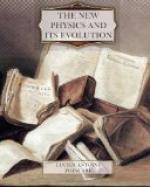[Footnote 5: “Nothing is created; nothing is lost”—ED.]
On this hypothesis, matter would only be the capacity for kinetic energy, its pretended impenetrability energy of volume, and its weight energy of position in the particular form which presents itself in universal gravitation; nay, space itself would only be known to us by the expenditure of energy necessary to penetrate it. Thus in all physical phenomena we should only have to regard the quantities of energy brought into play, and all the equations which link the phenomena to one another would have no meaning but when they apply to exchanges of energy. For energy alone can be common to all phenomena.
This extreme manner of regarding things is seductive by its originality, but appears somewhat insufficient if, after enunciating generalities, we look more closely into the question. From the philosophical point of view it may, moreover, seem difficult not to conclude, from the qualities which reveal, if you will, the varied forms of energy, that there exists a substance possessing these qualities. This energy, which resides in one region, and which transports itself from one spot to another, forcibly brings to mind, whatever view we may take of it, the idea of matter.
Helmholtz endeavoured to construct a mechanics based on the idea of energy and its conservation, but he had to invoke a second law, the principle of least action. If he thus succeeded in dispensing with the hypothesis of atoms, and in showing that the new mechanics gave us to understand the impossibility of certain movements which, according to the old, ought to have been but never were experimentally produced, he was only able to do so because the principle of least action necessary for his theory became evident in the case of those irreversible phenomena which alone really exist in Nature. The energetists have thus not succeeded in forming a thoroughly sound system, but their efforts have at all events been partly successful. Most physicists are of their opinion, that kinetic energy is only a particular variety of energy to which we have no right to wish to connect all its other forms.
If these forms showed themselves to be innumerable throughout the Universe, the principle of the conservation of energy would, in fact, lose a great part of its importance. Every time that a certain quantity of energy seemed to appear or disappear, it would always be permissible to suppose that an equivalent quantity had appeared or disappeared somewhere else under a new form; and thus the principle would in a way vanish. But the known forms of energy are fairly restricted in number, and the necessity of recognising new ones seldom makes itself felt. We shall see, however, that to explain, for instance, the paradoxical properties of radium and to re-establish concord between these properties and the principle of the conservation of energy, certain physicists have recourse to the hypothesis that radium borrows an unknown energy from the medium in which it is plunged. This hypothesis, however, is in no way necessary; and in a few other rare cases in which similar hypotheses have had to be set up, experiment has always in the long run enabled us to discover some phenomenon which had escaped the first observers and which corresponds exactly to the variation of energy first made evident.




